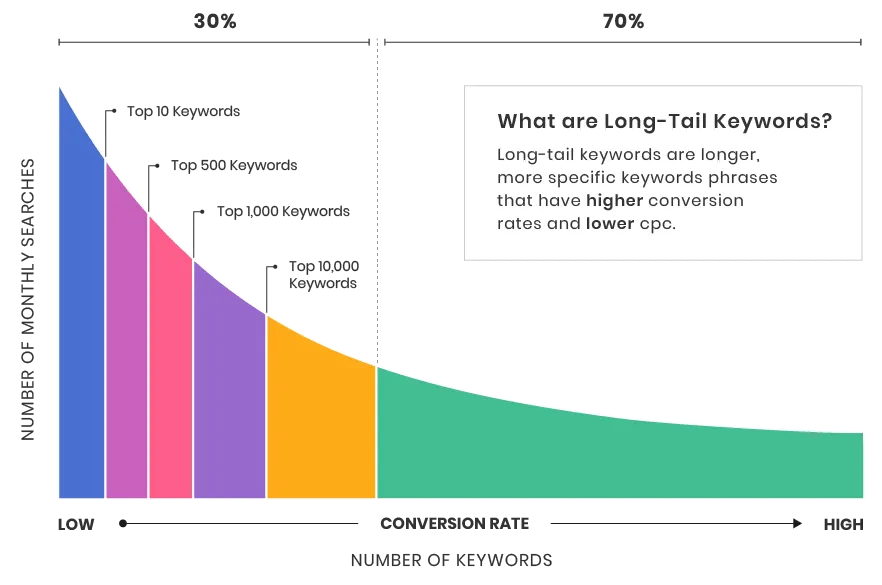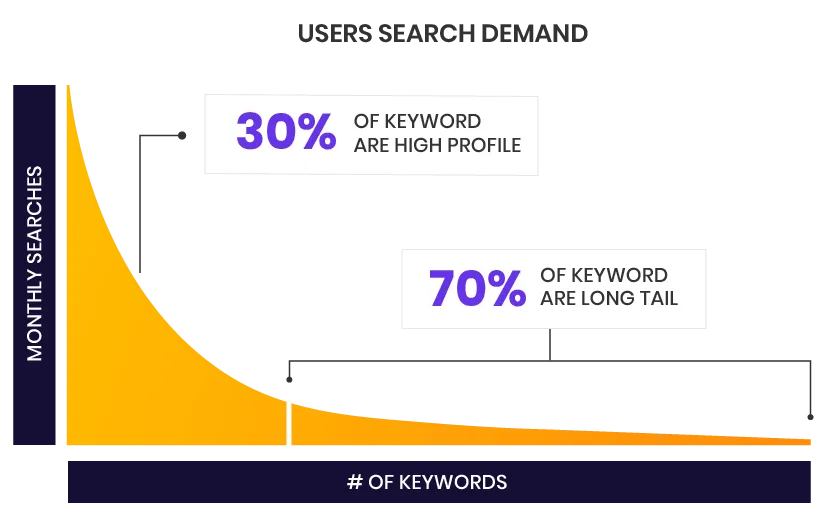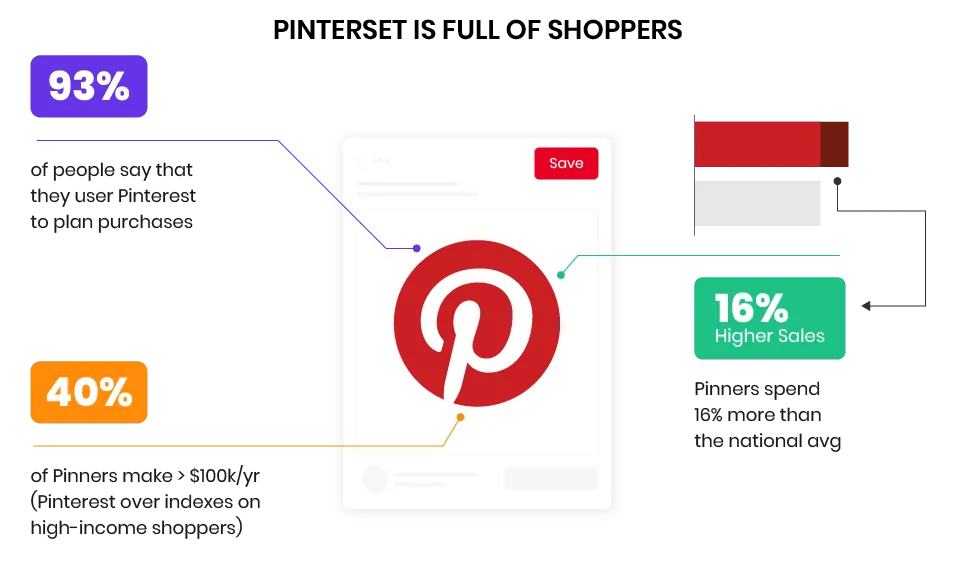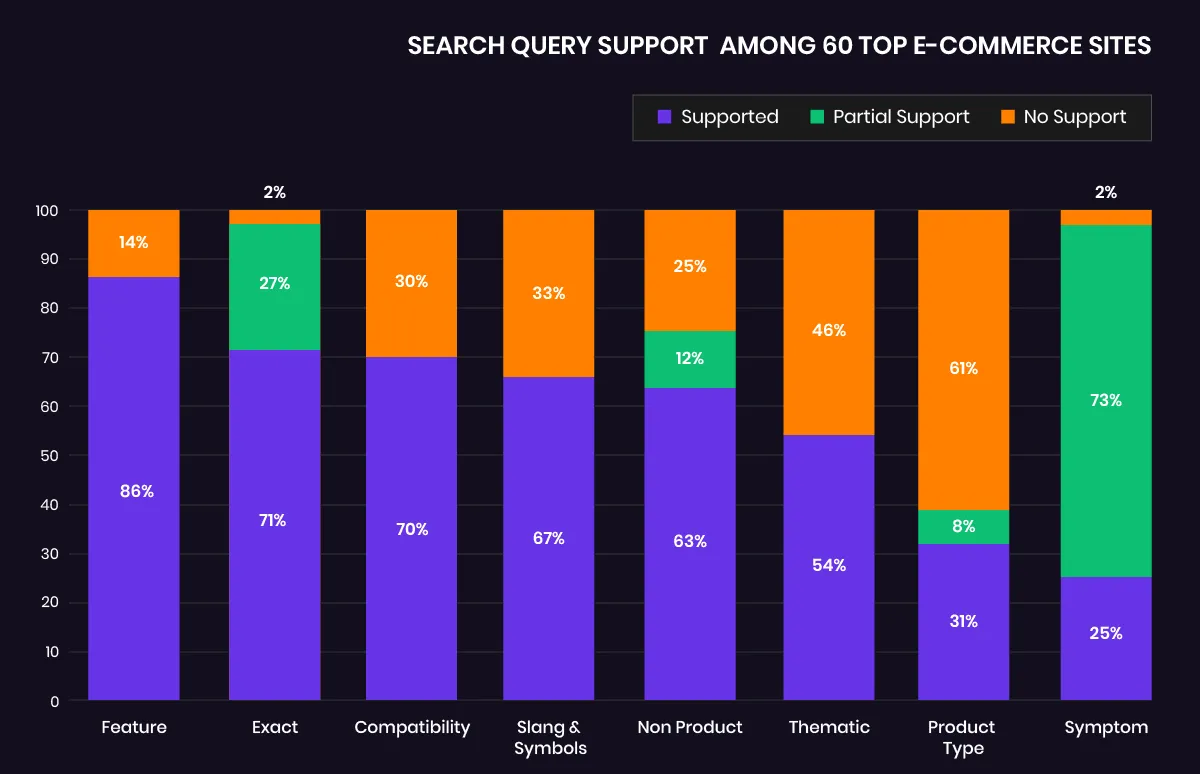
Complete Guide to Dominate Your Ecommerce Keyword Research
Search Engine Optimization or SEO yields one of the best ROI for businesses. The same goes for eCommerce too. 71% of buyer journeys start from search engines. But, most eCommerce websites today are not leveraging this fact.
46% of US-based small businesses are yet to launch their website. And, even the ones who have done so solely rely on paid advertising for their traffic. Paid advertising is good. But, SEO can help you achieve long-lasting results with little investment.
Keyword research is one of the first and most important steps to SEO. If you get your keywords wrong, then your entire SEO strategy won’t work as expected.
There are many factors to consider while doing the keyword research for your site. If you miss the good ones, then you are at a huge loss.
This guide will help you learn and understand A to Z of eCommerce keyword research. Just by following the tips in this article, you’ll succeed in the SEO game.
What is Keyword Research?
A keyword is simply the phrases that people use to search on search engines like Google. For example, suppose that you want to learn about eCommerce SEO. You’ll type “eCommerce SEO tips” or “eCommerce SEO ultimate guide” on Google. These are called keywords.
Ecommerce Keyword research refers to finding the right keywords for your eCommerce store. You can optimize your site for these keywords, so Google will rank your website when people search for those keywords.
For example, suppose that your store is about polo next t-shirts. Then through research, you’ll find the keywords that people are using to search for such t-shirts.
You’ll probably come up with a list of target keywords. These will look like “Men’s polo t-shirts” or “polo neck t-shirts for men.” When people search for these terms, your products and website will show up. It will increase the traffic to your website and ultimately increase your sales.
Importance of Keyword Research for eCommerce
Now you understand the meaning of keyword research. Let’s understand why you need to master it.
1. Increased Traffic to Your Online Store
As an eCommerce business owner, your primary goal will be to bring more visitors to your site. When you get more visitors, you’ll achieve increased sales and revenue.
 By doing proper keyword research, you will rank for top keywords on Google. It means more users will find you on the Google search engine results page.
By doing proper keyword research, you will rank for top keywords on Google. It means more users will find you on the Google search engine results page.
Even by ranking on just the first page of Google, you will see an increased number of website visitors each month. Over time, this traffic will lead to increased ROI for your eCommerce business.
2. Increased Conversion Rate
Not every user that comes to your website is the same. Suppose that you get lots of visitors. But, if your products don’t interest these visitors, then your conversion rate will be low.
 By researching the correct keywords, you’ll optimize your store for the right kind of visitors. These visitors will be interested in your products. Hence you’ll also see an increased conversion rate.
By researching the correct keywords, you’ll optimize your store for the right kind of visitors. These visitors will be interested in your products. Hence you’ll also see an increased conversion rate.
3. Increased Trust Leading to More Sales
Most users trust Google. Even when a not-so-well-known brand comes up on Google search, users trust it. Users tend to rely on organic search results more than ads.
Through keyword research, you can rank organically for the top keywords in your niche. So, people will trust your brand more, leading to more sales.
4. Optimize Your Store for Purchase Intent
Suppose users search for keywords with phrases such as “buy.” Such keywords have a purchase intent. When people search with purchase intent, they have already decided to buy products. Hence, the benefits are more.
-min.webp) Through keyword research, you can find the relevant keywords with purchase intent. You can use these to optimize your site’s product pages. This way, you’ll get direct conversions from search engine traffic.
Through keyword research, you can find the relevant keywords with purchase intent. You can use these to optimize your site’s product pages. This way, you’ll get direct conversions from search engine traffic.
5. Increased Brand Awareness
The competition in the eCommerce industry is immense. Even if your products are very specific, you will have tons of competitors. So, increasing brand awareness can be tough.
But, through research, you can find the right target keywords with informational and commercial intent. By optimizing for these keywords, more people will learn about your brand. Also, more users will understand your value proposition.
Eventually, your brand awareness will increase. And, people will start purchasing your products just for your brand’s name.
Short-Tail Keywords Vs. Long-Tail Keywords
You would have heard terms such as short-tail and long-tail keywords lots of times. Top marketers will always recommend you to use a mix of short-tail and long-tail keywords.
Short tail keywords are more general search terms used by people. These usually are 1 or 2 words long. Short tail keywords are difficult to rank for because the competition is high.
Long-tail keywords are longer, more specific search terms. These usually consist of 3 to 4 words. Long-tail keywords are easier to rank for, but their search volume is low.
Let’s look in detail at the differences between short tail and long-tail keywords.
| SHORT-TAIL KEYWORDS | LONG-TAIL KEYWORDS | |
|---|---|---|
| LENGTH | Short-tail keywords are generally shorter in length, with one or two words. | Long-tail keywords are usually longer, usually three or more words. |
| SPECIFICITY | Short-tail keywords usually have a broad or generic intent. Example : t-shirts |
Long-tail keywords have a much more specific meaning than short-tail ones. Example : Buy polo neck t-shirts men |
| SEARCH VOLUME |
The search volume per month for short-tail keywords is high, as these keywords are more generic. And more people search for them. Hence, you’ll get more traffic for these keywords. Example : More people will search for “t-shirts”. |
The search volume for long-tail keywords is much higher. It is because such keywords are very specific. And, a lesser number of people will search for them. Hence, you’ll get lesser website traffic for these keywords. Example : Not many people will search for “blue polo neck t-shirts men”. |
| COMPETITION | Since short-tail keywords get a lot more search volume, the competition is much higher. Hence, ranking for such keywords in the top positions is very difficult. | Long-tail keywords get a lower search volume. Hence, it is easier to rank on the 1st page for such keywords. |
| COST | A lot of websites compete for short-tail keywords. Hence, the Cost Per Click (CPC) for such keywords is much higher. | The CPC for long-tail keywords is low as compared to short-tail keywords. It is because the competition is low. |
| INTENT |
Users tend to search for short-tail keywords when they are trying to learn about it. Hence, the intent for such keywords is more informational. For example, when users search for “washable rugs”, they usually know more about it. |
While searching for long-tail keywords, users are trying to make a purchase decision. Hence, for such keywords, the intent is more commercial. For example: For “buy a washable rug for living room”, the intent is commercial. |
| CONVERSIONS | With short-tail keywords, the intent is informational. Therefore, the chances of conversion are comparatively low. | For long-tail keywords, the user usually wants to make a purchase decision soon. Thus, the chances of conversion are higher. |
| TIME TO RANK | The time taken to rank short-tail keywords on the top position will usually take much longer. It is because of high competition and greater SEO difficulty. | For long-tail keywords, the time taken to rank is comparatively lower. It is because of low competition and SEO difficulty. |
| ROI | Although the traffic for short-tail keywords is high, ROI is low. It is because the CPC is high, and chances of conversion are low. | Even with lesser website traffic, the ROI is more. It is because of lower competition, lower CPC, and higher chances of conversion. |
Keyword Research Tools for Your eCommerce Website
Ecommerce keyword research can be much more effective and precise if you take the help of certain tools. Here is a list of tools that can help you dominate the eCommerce market.
Ahrefs
Ahrefs is a great keyword research tool that can be of immense help to you. Using ahrefs, you can plan your entire content. You can also plan the set of keywords that you should use to target the eCommerce market.
Ubersuggest
Ubersuggest is another SEO tool that can help you with extensive keyword research. The tool shows you everything, from the SEO difficulty to the search volume. These keyword metrics can help you plan your target keywords better. You can target a mix of lower and higher volume keywords for the best possible results.
Google Keyword Planner
Google Keyword Planner is a free tool by Google. Google created it for the advertisers to help them pick the right keywords for their PPC campaigns. However, you can use the tool effectively to find keywords for your eCommerce website.
The tool provides you precise information about the keywords’ monthly search volume. It also gives you a list of LSI keywords related to your main target keywords.
SpyFu
SpyFu is an excellent tool that can help you spy on your competitors’ keywords. Competitive analysis is the main part of keyword research. By finding out what your competitors are ranking for, you can get helpful insights for your keyword research. Using SpyFu, you can get a list of keywords of your eCommerce competitors.
AnswerThePublic
AnswerThePublic tool helps you find all the question-based keywords. These can help optimize your eCommerce website for the “People also ask” section. You can also use these question-based keywords to optimize for featured snippets and voice search queries.
Keywords Everywhere Google Chrome Extension
The Keywords Everywhere Chrome extension helps you get keywords from everywhere. The tool will pull up all the relevant keywords for every Google search you make. It also shows you a graph with trends related to that keyword.
The tool also pulls up all the long-tail keywords for your main keyword. Hence, this tool can be really helpful in finding relevant eCommerce keywords on the go.
SEMrush
SEMrush is one of the most popular SEO tools out there. The tool can help you come up with the best set of eCommerce target keywords. The tool can also help you find the top keywords of your competitors.
LSIGraph
Latent Semantic Indexing (LSI) keywords are the keywords related to your main target keywords. It is good to optimize your product pages, category pages, and content for LSI keywords.
When you optimize your eCommerce website for LSI, Google will understand the context of your website better. LSIGraph is a great tool that can help you instantly generate a list of LSI keywords.
Tips to Dominate your eCommerce Keyword Research
By now, you would have understood everything about eCommerce keywords. Let’s look at some effective ways to dominate your eCommerce keyword research.
1. Optimize Your Website for Long-Tail and LSI Keywords
As mentioned in the previous sections, long-tail keywords can fetch you maximum ROI. Most high-authority veterans such as Amazon occupy the short-tail keyword positions. These eCommerce websites and brands are almost impossible to beat.
For instance, if you try to rank for the keyword “shoes,” it will be next to impossible. But, long-tail keywords are the ones you must go after. If you optimize for terms such as “pink baby shoes online,” then your chances increase.
 Also, when you optimize your website for long-tail keywords, you automatically optimize for shorter ones. But, the vice versa is not true. Hence, try to focus more on optimizing your website for mid-tail to long-tail keywords. It holds for your product pages, category pages, and content.
Also, when you optimize your website for long-tail keywords, you automatically optimize for shorter ones. But, the vice versa is not true. Hence, try to focus more on optimizing your website for mid-tail to long-tail keywords. It holds for your product pages, category pages, and content.
You should also optimize your content for related or LSI keywords. This way, Google will understand the context of your website and products better. And thus, the chances of ranking for related keywords will also increase.
2. Look for Keywords with Different Search Intent
Search intent is a great deal when it comes to keyword research. It refers to the intent behind the user’s search.
Does the user want to learn about the keyword?
Is the user confused about which product to buy?
Is the user looking to make a purchase.?
You can find the intent behind the search through the keywords. Here are the most common types of keywords for intent:
Informational Keywords : Here, the user is just learning about the product. For example, “Bluetooth Earbuds.” The user is just trying to learn about what earbuds are and what they do. The user is not going to make the purchase.
Investigational Keywords : Here, the user is usually trying to decide between two products. For example, “Sony earbuds Vs. Apple AirPods”. The user wants to compare both the products. The intent is slightly more commercial.
Transactional Keywords : Here, the user has almost decided to make the final purchase. For example, “Buy Apple AirPods.” The user has decided to go with Apple and is going to make the purchase soon.
As an eCommerce site, you want the user to purchase your product. Hence, you must optimize your product pages for transactional keywords.
But, you shouldn’t go only after transactional keywords. You should also optimize for informational and investigational intent. Only then will users learn more about your brand, start trusting you, and finally buy from you.
You can optimize your site content for informational and investigational intent. This content can be blog posts, case studies, testimonials, and videos.
3. Check Popular Marketplaces for Keywords
Popular marketplaces like Amazon dominate the eCommerce SEO for a reason. Such websites are a gold mine for finding keywords. Hence, you should use this opportunity to find keywords for your eCommerce website.
Using these marketplaces, you can get hold of a whole new set of keywords. Suppose that you have been optimizing your online store for keywords related to “earbuds.” But on these popular marketplaces, you found that people also look for the same products using the keywords “earpods.”
To find keywords on such popular marketplaces, you can use their search option. Simply start typing terms related to your website. And you’ll get lots of autocomplete options.
These are not random words. These are the keywords that users have used while searching for products. You can also find keywords in the category sections. You can also use the product descriptions of these popular marketplaces to find keywords.
4. Use Google Search for Finding Product and Content Keywords
Google search is one of the easiest places to do your keyword research. If you want to take away just one method from this list, it should be this one.
Google search is the most authentic way to find keywords. It is because it will show only those keywords that users are searching for every day. The only problem with this method is that you cannot find details such as search volume and CPC.
There are four places on the Google search results page that can help you find keywords:
Google Autocomplete : Just start typing your main product in the search bar, and you’ll get tons of autocomplete options.
The “People also ask” Section : This consists of questions that users ask about your products. Using these, you can optimize your product description, FAQ page, or content.
The “Related Searches” Section : This section at the bottom gives you a list of keywords related to your search.
Top Results: You can look for the product feed and top results for your search. Using this, you’ll know which keywords you can use to land on Google search’s top position.
5. Make Use of Keyword Research Tools to Analyze Search Volume and Difficulty
Keyword research tools are the most widely used ways to look for keywords. All you have to do is search for your eCommerce website topic or any specific products on these tools. The top tools, such as ahrefs, SEMrush, and Ubersuggest, will bring up a list of keyword ideas.
 These tools also show other comprehensive keyword details. These can be data such as search volume, CPC, keyword difficulty, and SERP features. These come up along with keyword variations, related keywords, and questions.
These tools also show other comprehensive keyword details. These can be data such as search volume, CPC, keyword difficulty, and SERP features. These come up along with keyword variations, related keywords, and questions.
Using any of these tools, you can come up with comprehensive target keywords for your website. Data such as search volume and difficulty will help you find keywords that will work best for your site.
6. Analyze Your Competitors’ Keywords
Apart from top marketplaces, you must also target keywords that your top competitors use. For instance, let’s consider your eCommerce website is about products related to camping gear. Then you should take the time to analyze all the top online stores that sell camping gear.
You can do this by analyzing your competitors’ web pages on any of the keyword research tools. You can analyze the homepage, landing pages, or the entire domain. These tools will analyze their website and come up with a set of keywords.
You can do this for your competitors’ home page, landing page, product pages, and blogs. This way, you’ll discover new keywords that you have the chance to rank for.
You can also use Google Keyword Planner to analyze competitors’ keywords. Just type in the landing page or homepage of your competitor’s website. And you’ll get a list of keywords that they have optimized for.
7. Check Wikipedia for Related eCommerce Keywords
Wikipedia is one of the most comprehensive websites full of relevant information. It is a crowdsourced platform that has content related to every topic possible. And it ranks on the top for almost every informational keyword out there.
But, how can you use Wikipedia for your eCommerce keyword research?
The contents section of Wikipedia is one of the best places to look for keywords. Suppose you have lots of broader keywords for your website. If you want specific keywords, then you can find them through the contents section of Wikipedia.
This way, you can create content, and around all the long-tail keywords. So, your chances of ranking will get higher.
8. Check Google Trends for Currently Trending Keywords
Some eCommerce products are seasonal. Some may depend on weather patterns such as winter clothes. Simultaneously, some products get popular during festive seasons—some products trend for a whole year. A great example would be the demand for “face masks” during the pandemic outbreak.
You should use these trends in your favor. By finding and comparing trending keywords, you can maximize your chances of ranking. Google Trends is one of the best tools to analyze trends.
Using Google Trends, you can find keywords currently trending in your location. You can optimize your eCommerce website for these keywords. And quickly climb the SERP rankings.
9. Leverage Pinterest for Finding More Keywords
Pinterest, the visual social media platform, is not just used for inspiration. Most users use the platform when they are thinking about making a purchase. 89% of US Pinterest users use the platform with a purchase intent!
 Pinterest ads are called promoted pins. Pinterest can pull up a list of relevant keywords for your product, and it is just like Google Keyword Planner. You can type in your product name on Pinterest promoted pin planner. The platform will show keywords that users are searching on the platform.
Pinterest ads are called promoted pins. Pinterest can pull up a list of relevant keywords for your product, and it is just like Google Keyword Planner. You can type in your product name on Pinterest promoted pin planner. The platform will show keywords that users are searching on the platform.
You can also use Pinterest’s search bar to find keywords that users are commonly searching for. The purchase intent of Pinterest users is high. So, you’ll get more keywords with transactional intent here.
10. Use Your Website Search Query Keywords
If your eCommerce website has been active for a while, you can use your own site’s search bar. Most people use eCommerce website’s search options to look for specific products. Hence, you’ll also find what keywords are users are looking for on your website.
 Using these keywords, you can optimize your existing product pages and category pages. You can also use these keywords to optimize your blog content. It can be a brilliant and easy way to target and rank for more keywords.
Using these keywords, you can optimize your existing product pages and category pages. You can also use these keywords to optimize your blog content. It can be a brilliant and easy way to target and rank for more keywords.
Use these Effective Strategies to Dominate the eCommerce SEO Space
Keyword research can make or break your eCommerce website’s SEO. Picking the right keywords can make a world of difference to your search engine rankings. And hence, it is important to learn the most effective ways to go by it.
This brief guide provides an almost exhaustive list of eCommerce keyword research ideas. So, start optimizing your website for these keywords today. And, watch your rankings soar.
Do you want any help in finding the right keywords for your eCommerce store? Then get in touch with us.
ABOUT THE AUTHOR:
Anahi Farley

Anahi Farley has more than nine years of expertise in the copywriting industry. She loves to blog about ecommerce, SEO, and conversion optimization. By writing quality content, she is helping many ecommerce businesses to increase their traffic and revenue.
Related Post
Complete Guide to Dominate Your Ecommerce Keyword Research
Your Pocket Manual To The Must-haves in Ecommerce Websites
Artificial Intelligence on Ecommerce
How to Migrate an Ecommerce Website Without Affecting SEO Rankings?
Importance of UX for an eCommerce site & How it Impacts your SEO?
Importance of E-A-T for your eCommerce Site & How it Influences your SEO?
A Complete Guide to Technical SEO for eCommerce Websites
Important eCommerce Metrics You Should Track to Ensure Success
Important of User-Generated Content on eCommerce
On-page SEO Mistakes to Avoid On Ecommerce
Ecommerce SEO Checklist: Keyword Research
Why Choose Haitna as Your eCommerce SEO Agency?
Importance of SSL/HTTPS for an Ecommerce Website & Its effects on SEO
List of eCommerce SEO Trends to Look out for in 2021
Importance of Blogging for an eCommerce Site
30 Reasons for the failure of an eCommerce website
Ecommerce Landing Page Optimization Tips to Increase Sales
ABOUT THE AUTHOR:
Anahi Farley

Anahi Farley has more than nine years of expertise in the copywriting industry. She loves to blog about ecommerce, SEO, and conversion optimization. By writing quality content, she is helping many ecommerce businesses to increase their traffic and revenue.
Recent Post
30 Reasons for the failure of an eCommerce website